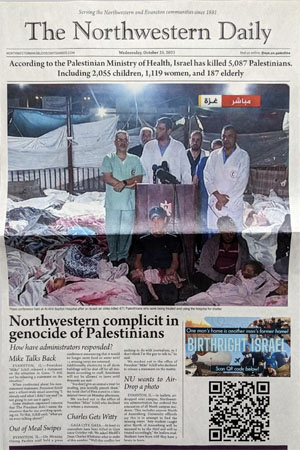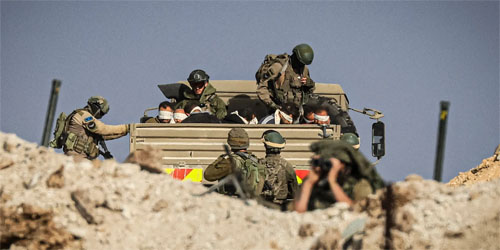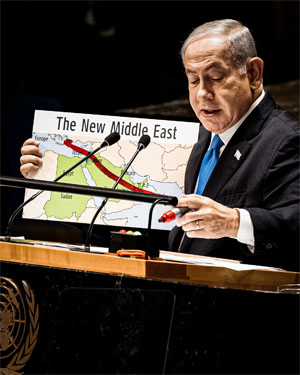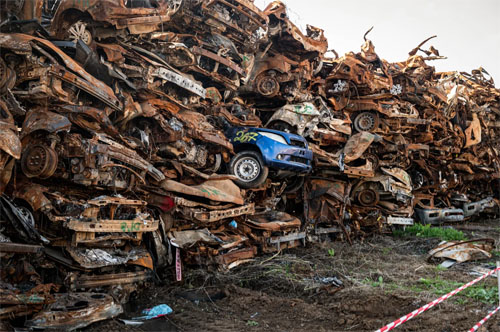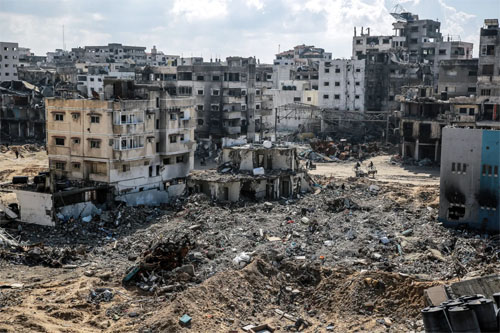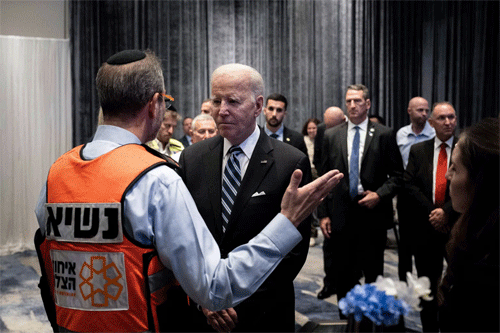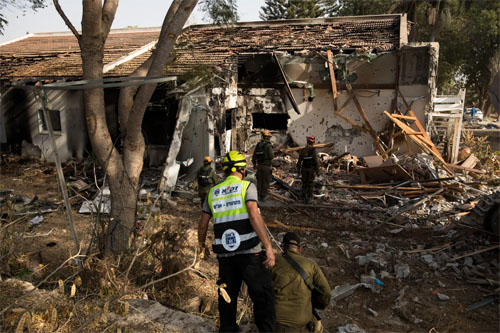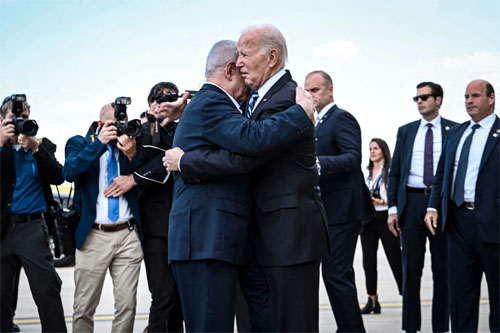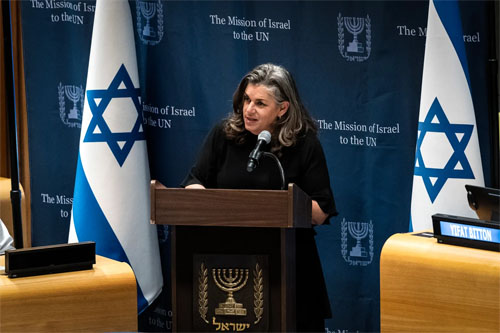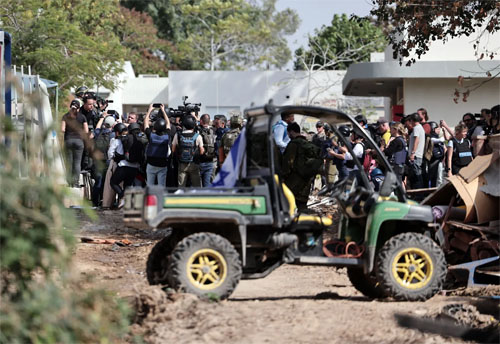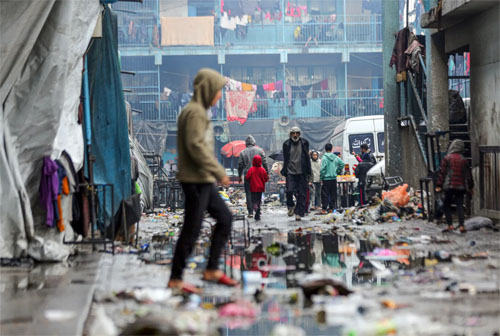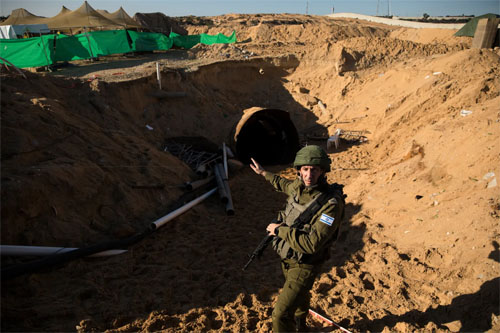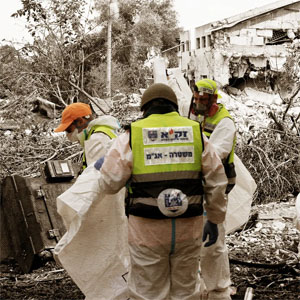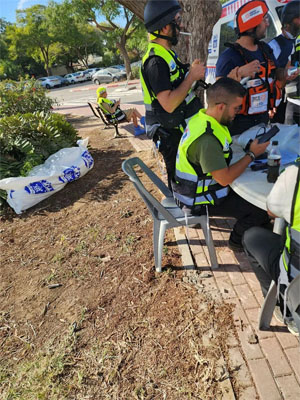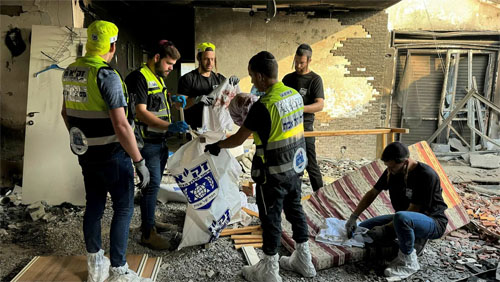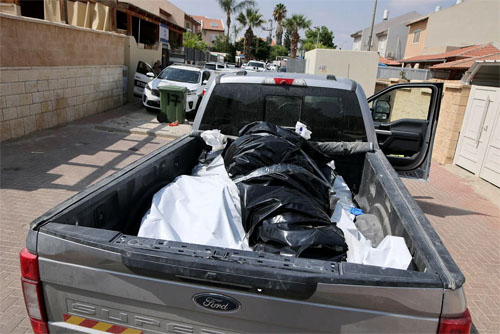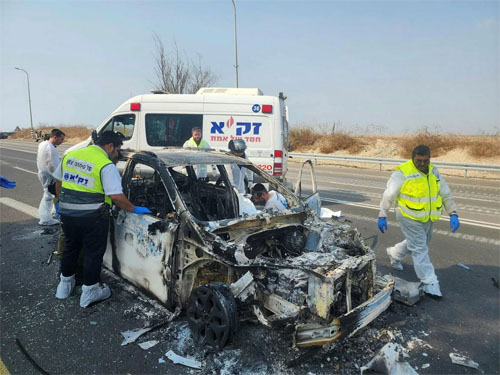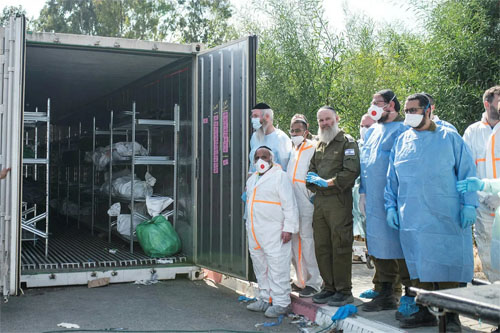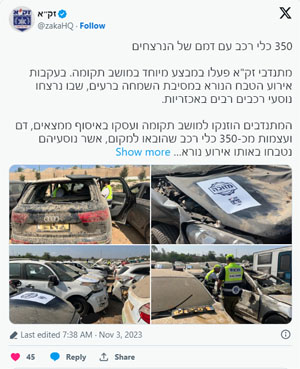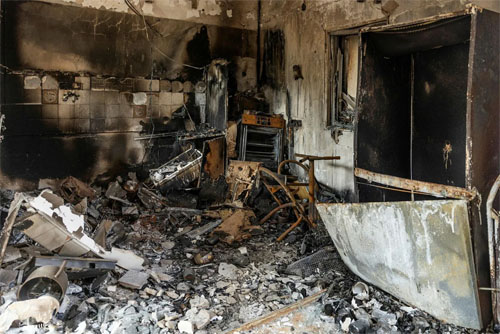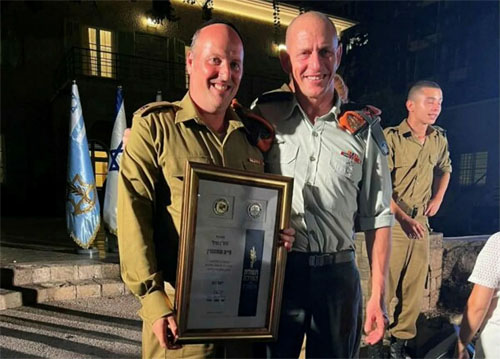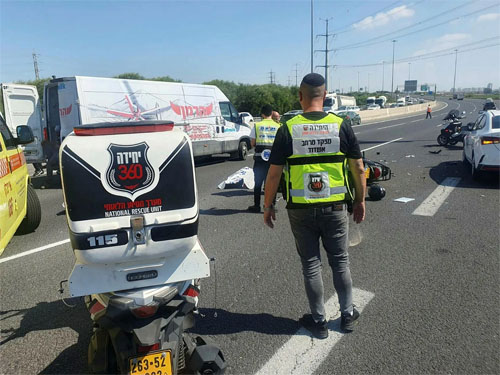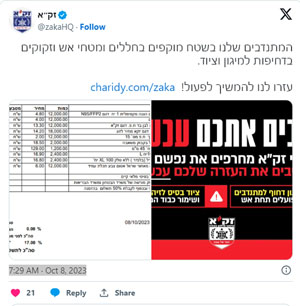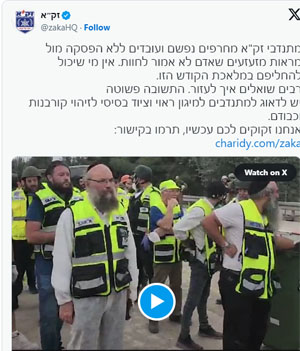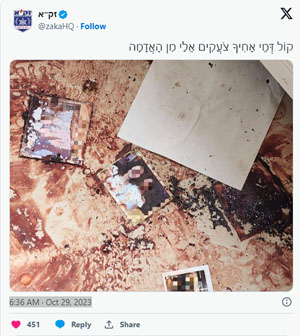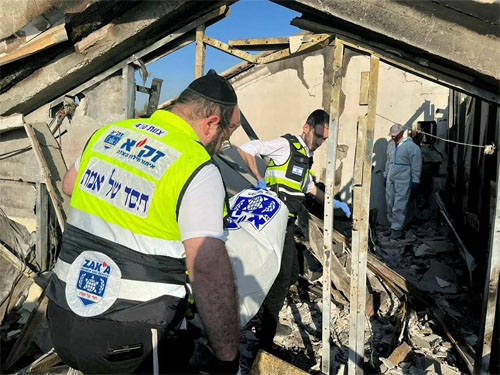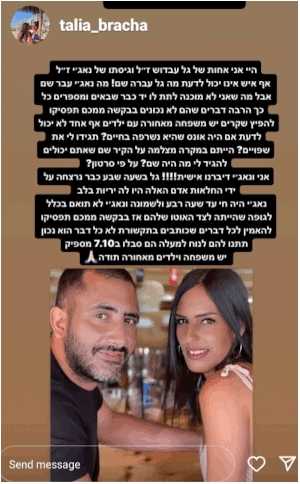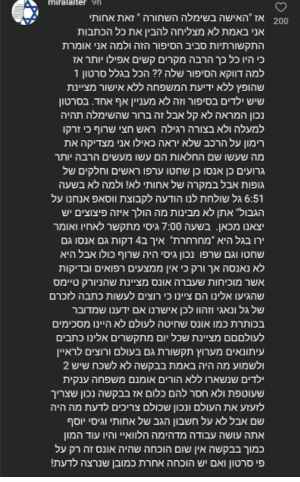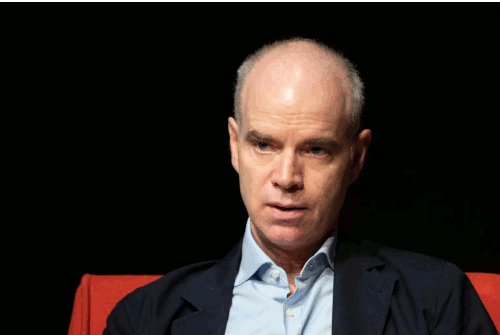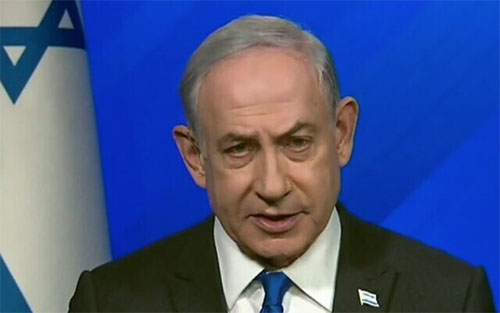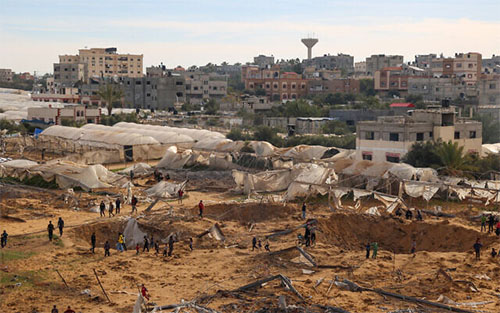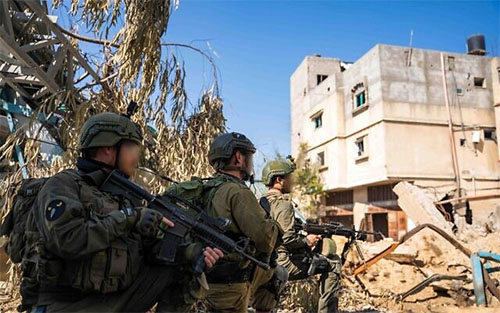Drone Strike Kills 3 U.S. Troops in Jordan; Risk Grows of Regional War over Israeli Assault on Gazaby Amy Goodman
DemocracyNow!
January 29, 2024
https://www.democracynow.org/2024/1/29/ ... transcriptThe Pentagon is accusing Iranian-backed militants of killing three U.S. soldiers in a drone strike at a base in Jordan along the Syrian border, making the troops the first U.S. armed forces killed by enemy fire in the region since October 7. A group called the Islamic Resistance in Iraq has claimed responsibility for the attack and said attacks would escalate if the U.S. continues to support Israel during the latter’s destruction of Gaza. President Biden vowed the U.S. would respond. “There will be more of these attacks, for sure,” says Palestinian American journalist Rami Khouri, who lays out the simmering regional conflict and questions U.S. foreign policy running counter to American opinion and strategic goals. “All these actions, are they for the sake of Israel? … Or is this really about U.S. strategic interests?”
TranscriptThis is a rush transcript. Copy may not be in its final form.
AMY GOODMAN: The first U.S. troops have been killed by enemy fire in the Middle East since Hamas attacked Israel October 7th. The Pentagon is accusing Iranian-backed militants of killing three U.S. soldiers in a drone strike at a base in Jordan along the Syrian border. The attack reportedly also injured 34 other U.S. troops. On Sunday, President Biden vowed the U.S. would respond, quote, “at a time and in a manner of our choosing,” unquote. The attack comes less than a month after a U.S. drone strike in Baghdad killed the head of an Iranian-backed militia.
A group called the Islamic Resistance in Iraq has claimed responsibility for the attack and released video of the attack it says shows the group attacking the American military base. In a statement, the group said, quote, “If the U.S. keeps supporting Israel, there will be escalations. All U.S. interests in the region are legitimate targets, and we don’t care about U.S. threats to respond,” they say.
For more, we’re joined by Rami Khouri, Palestinian American journalist, senior public policy fellow at the American University of Beirut, his recent piece for Al Jazeera headlined “Watching the watchdogs: The 5 Ds of US Middle East policy: Washington’s delusion, denial, dishonesty, distortion, and diversion have had disastrous consequences for the region.”
Rami, welcome back to Democracy Now! So, if you can talk about this latest attack, three U.S. soldiers dead, 34 wounded, the wounded being medevaced back to the United States? Talk about the significance of who’s claimed responsibility and what this means for a possible escalating regional conflict.
RAMI KHOURI: Thank you. Glad to be with you again, and great to see a show like yours doing such a wide range of coverage of important issues. It’s rare on American TV. I’m happy to be with you.
So, I would say that the significance here is severalfold. First of all, the people who did this attack, the Americans blame a certain group in Iraq funded or backed by Iran. There’s dozens of these groups all over the region. There’s almost as many of these groups around the region as there are American military bases around the region. I think there’s something like 30 or 35 American military bases, with something like 30-40,000 troops. And, of course, when you add the ones that come in on the aircraft carriers, it’s more than that.
So, what you have to see this — you have to see this in the context of a regional situation with many American military installations, some of them killing and attacking Arabs and others, some of them not. And you have to see the groups from Arab countries, official state groups and nonstate actors, like Hezbollah and Hamas and Ansar Allah. That’s the context in which we have to see this.
There are so many potential people who could have done this attack, which should make us wonder about why are there so many people who are potential attackers. It’s because they see the American presence linked very close to what Israel is doing in Palestine. They see this as a threat. And they come right out and say it. The thing about the Islamic Resistance in Iraq, like the Resistance Axis, which is the broader Middle East coalition of Hezbollah, Hamas, Ansar Allah in Yemen, the Islamic groups in — resistance groups in Syria and Iraq, their significance is that they come right out — and they’ve said it so many times — “We’re not scared of being attacked. We’re not put off by the U.S. and Israeli threats. We’re defending our territory. And if we’re aggressed against, we are going to fight back.” This is unusual in this region, but it’s going on all the time.
The Ansar Allah in Yemen have been saying the same thing. The U.S. went in there with — and the U.K., the two great colonial powers in the Middle East of the last century. Both have been attacking Ansar Allah targets in Yemen, and the Ansar Allah people say, you know, “Go ahead. Attack. We don’t care.” And they keep attacking back and hitting ships and trying to fire at other places, as well.
So, that’s the context that we have to look at. And some of it is linked to Gaza. Some of it was there before Gaza, which is another important thing. And the Ansar Allah in Yemen and others have said, “Look, if the U.S. stops actively supporting the genocidal, savage moves of Israel in Gaza, we will stop attacking American targets.” It is significant that this is the first direct strike that killed three Americans, but that’s not as significant as the broader picture that we have to look at.
AMY GOODMAN: Rami Khouri, can you talk about the other countries and their response and where they stand vis-à-vis the United States and Israel? For example, Jordan. I listened to the Jordan deputy prime minister yesterday saying this did not happen on Jordanian soil, it happened in Syria. But, in fact, it looks like it did happen in Jordan. And why that was relevant — because, of course, they’re all very close right there on the border — is he said if it happened on Jordanian soil, they would consider it an act of war.
RAMI KHOURI: Yeah. Jordan tries to stay out of these big conflicts. It’s a small country. It has quite a sophisticated military capability. They spend a lot of money and attention on their security services, both internally and regionally, their intelligence services, their technical capabilities, special forces, things like that. And they try to not get directly involved in large-scale warfare, but to do a little, you know, strategic, pinpoint actions when necessary either to protect themselves or to help their allies, like the U.S. and others.
It’s hard to know exactly where this attack came from. If the U.S. intelligence agencies have the information, they should make it public so people stop speculating. But Jordan is a country with a huge territory on the borders with three, four countries, and it’s very hard to patrol it. By the way, I know that area in northeastern Jordan quite well. I spent many, many days there years ago when I was writing books on archaeology and I lived in Jordan.
And there’s two things I think people should recognize about this area. First of all, if you look at that aerial photograph which you showed of the camp, of Tower 2, I think it’s called — if you look at that photograph and then you go back into the archaeological journals and look at pictures, aerial photographs of Roman and Byzantine camps that archaeologists have mapped in surveys, you find exactly the same thing. And this is a sign that these kinds of foreign military installations inside the region, especially on peripheral border areas, don’t have a long lifestyle, and they will be abandoned, because the local people don’t want them there.
So, the second thing I’d say, that area is really fascinating, because, you know, people call it a desolate desert area. It’s a desert area now because of climate change and overgrazing and things like that, but this was a strategically important region in the beginning of modern civilization as we know it in the Bronze Age. There’s people who think that the Abraham’s Path came through here on his way into what’s known as the promised land, that this is an area developed early urbanism in the Bronze Age, walled large towns, sophisticated water systems, showing the human capabilities that have been in this area for about 5,000 years. So, those are just two little side points I’d like to throw in there.
AMY GOODMAN: I have a last question. Trita Parsi, one of the heads of the Quincy Institute, a well-known Iranian American author and analyst, talking about the U.S. soldiers who died, said, “They didn’t die defending US interests, they died defending Biden’s refusal to press Israel for a ceasefire. Their lives were put at risk by Biden to defend Israel’s ability to continue its carnage in Gaza.” If you could respond to that and, among other things, a thousand Black pastors, across the political spectrum, representing hundreds of thousands of congregants in the Black community in the United States, calling on Biden — who are normally mainly constituents of Biden, supporters of Biden — for a ceasefire? This issue of rather than doing what the Republicans, like Lindsey Graham and Senator Cornyn, are calling for — bomb Iran — are saying, “Go the other way,” as a result of this?
RAMI KHOURI: Yeah, those are two really important points. On the point of the Black pastors — and they represent, I think, around a couple hundred thousand parishioners — they’ve now joined the Arab American and Muslim American groups, located all over the country, with the epicenter in Michigan, who are also telling Biden the same thing, that we’re not going to vote for you if you keep being a part of the genocide in Gaza that Israel is performing. So, this is significant because it’s showing us that American politicians really don’t care about morality or the law. They care about electoral incumbency and staying in power, which is probably what all politicians do, to be fair. Americans are no different.
So, this is a question now that is raised with the death of the three Americans and, I think, 24 injured. And there will be more of these attacks, for sure, because, keep in mind, the Axis of Resistance and these groups, the Islamic Resistance in Iraq and Syria, openly say, “Attack us. We don’t care. You’re not going to frighten us.” And this is unusual.
So, the question is: Are American troops now in the Red Sea, in Iraq, possibly in other places dying for the sake of Israel? Israel wants an American-Iranian confrontation. They’ve openly tried to do it, and the Americans have been thoughtful, unusually, in the Middle East by resisting a full-scale war with Iran. But the question becomes: All these actions, are they for the sake of Israel — and not just Israel, but a right-wing, fascist majority that now has been said by the U.N.'s highest court, the world's highest court, to be involved in genocide? Or is this really about U.S. strategic interests?
U.S. strategic interests have not been well served by the 35, 40 military bases the U.S. has around the region. And remember, this Islamic Resistance in Iraq and Syria, it emerged out of the destruction that happened in Iraq after the American invasion of Iraq that toppled Saddam Hussein, the chaos that happened after that. It created a lot of these groups. Some of them were tribal, some of them were ideological, some of them were Iranian-linked, and some of them were American-supported. They’re all — you know, they have all kinds of patrons. But all of this goes back to what the U.S. did in Iraq, to a very large extent, and therefore the U.S. really needs to listen to people like Trita Parsi and others, to look at what are we doing in the Middle East.
Is this really the best thing for America’s well-being, or are we serving the interests of Israelis? And if we are, why are we doing that? Is it — and as the Black pastors are suggesting, is it maybe for electoral purposes? Is it for selfish political reasons in the U.S.? These linkages now are becoming much more clear. They’re controversial. They’re sensitive. But they have to be addressed.
And there is a possibility to stop all this militarism, which is the ceasefire that can be installed now quickly, if the U.S. wants, and then moving quickly to a permanent peace negotiation, which will require new leaders in Israel and in Palestine and other places, more credible leaders, but a negotiated peace that resolves the fundamental Israeli-Palestinian conflict and the wider Arab-Israeli conflict, which will not need 35, 40 American bases and constant, never-ending warfare. And this process is going to go on. It’s going to keep expanding, if we’re not careful. I don’t think we’re going to get a full-fledged war with Iran and Hamas and Hezbollah and others fighting against the U.S. and Israel. That would be a catastrophe for the whole region. I don’t think we’re going to get there. But what we have now is low-intensity, diversified regional warfare, and I think that’s going to continue.
AMY GOODMAN: Rami Khouri, I want to thank you for being with us, Palestinian American journalist, senior public policy fellow at American University of Beirut, speaking to us from Boston.
Up next, hours after the International Court of Justice ordered Israel to prevent genocide in Gaza, another genocide case was brought against the Biden administration. It was heard in Oakland, California. Stay with us.
*****************
Palestinians Charge Genocide in U.S. Court; Biden, Blinken Sued for Backing Israel’s War on Gazaby Amy Goodman
DemocracyNow!
January29, 2024
https://www.democracynow.org/2024/1/29/ ... transcriptThe Biden administration is on trial in the United States for failure to prevent the “unfolding genocide” in Gaza. On Friday, lawyers for the Biden administration argued the court lacks the proper jurisdiction to decide the case, while Palestinians and Americans testified about atrocities committed by Israel with American support. “I can’t think of another time where, in a U.S. federal court, Palestinians have been on the witness stand, one after the other after the other, describing their experiences under Israeli occupation,” says Diala Shamas, senior staff attorney at the Center for Constitutional Rights, which filed the case against President Joe Biden, Secretary of State Antony Blinken and Defense Secretary Lloyd Austin in November. “Being Palestinians in America necessitates our involvement in this case,” says Laila El-Haddad, a Palestinian writer who testified in court about her family’s experience under Israeli assault. “It obligates us to do everything we can to take every possible recourse, including legal recourse, to try and put an end to this, since it’s our tax dollars.”
TranscriptThis is a rush transcript. Copy may not be in its final form.
AMY GOODMAN: This is Democracy Now!, democracynow.org, The War and Peace Report. I’m Amy Goodman.
Just hours after the International Court of Justice in The Hague ordered Israel to take all measures to prevent genocide in Gaza, but stopped short of calling for a ceasefire, a hearing in another genocide case began here in the United States. The Center for Constitutional Rights first filed the case in November against President Joe Biden, Secretary of State Antony Blinken and Defense Secretary Lloyd Austin.
For three hours on Friday in a federal courtroom in Oakland, California, Palestinians and Americans testified, in person and by phone from Gaza, about the Biden administration’s failure to prevent what they called the, quote, “unfolding genocide” in Gaza. Lawyers for the Biden administration say the court lacks proper jurisdiction to decide the case, which they argue is a matter of foreign policy. The judge said, quote, “This probably is the most difficult case factually that this court has ever had.”
For more, we’re joined by two guests. Laila El-Haddad is a Palestinian writer and journalist from Gaza who testified in court Friday, author of Gaza Mom: Palestine, Politics, Parenting, and Everything in Between and co-editor of the book Gaza Unsilenced with Refaat Alareer, the Palestinian academic and activist killed in December by an Israeli airstrike in Gaza, along with his brother, his sister and her four children. Also joining us is Diala Shamas, senior staff attorney for the Center for Constitutional Rights.
We welcome you both to Democracy Now! Diala, why don’t you start off by laying out the case?
DIALA SHAMAS: Thank you for having me, Amy.
Yeah, so, we filed this case in November, laying out all of the ways in which the U.S. government, this Biden administration, in particular, President Biden, Secretaries Blinken and Austin, have failed in their duty to prevent an unfolding genocide in Gaza, but also are complicit in a genocide in Gaza. And we, a couple of days after filing our complaint, sought a preliminary injunction, which is essentially an emergency order, saying to the court, you know, the stakes here are so high, the harms to our plaintiffs, the Palestinians, who are plaintiffs in this case — and we have two human rights organizations with staff in Gaza that are plaintiffs, along with a number of individuals, some of whom are Palestinian Americans with families in Gaza, many of whom have been killed and displaced and are suffering all of the conditions that we have all come to know all too well, and we also have plaintiffs in Gaza, Palestinians who are, you know, currently displaced and who have also suffered injuries and loss of relatives. And in our motion for preliminary injunction, we essentially tell the court, unless the court intervenes now and issues an urgent — some urgent relief, the harm to these people, these Palestinians, will be so irreparable, and so we need some urgent action, pending the sort of resolution of the litigation, which always, of course, takes a much longer time. And so, the hearing — and the government filed a motion to dismiss, as well as an opposition to our motion seeking that urgent relief. And we had that hearing on Friday, which you were just describing, a really remarkable hearing.
In many ways, I think, in large part, you know, one of the most remarkable aspects was, as far as I can tell, as far as I’m aware of, we’ve been litigating Palestine-related cases and just been a student of them for decades, and I can’t think of another time where in a U.S. federal court Palestinians have been on the witness stand, one after the other after the other, describing, you know, their experiences under Israeli occupation, uninterrupted, in a way that offers a holistic, complete and complicated accounting of what has been happening to Palestinians, and in this case, not just over the course of the last 16 weeks since the latest assault and this unfolding genocide started, but really kind of placing it in a broader context. Every single one of our plaintiffs got up there and, in order to explain the impact to the court, to the judge, of the current moment and Israeli calls for Nakba now, had to explain the history of the Nakba. I’ve never heard the word “Nakba” be said in federal court so many times. And it was an important part of their telling, because they were there to — they were tasked with, you know, describing the urgency and the harm and the injury that they are experiencing. And it is, of course, a multilayered harm. And in order to explain how they even got to Gaza in the first place, they have to explain their families’ history as a refugee population, the fragmentation of Palestinians. So, there was so much that was really remarkable about the hearing, but that really stands out to me as one of the major aspects.
AMY GOODMAN: And, Diala, if you can quickly say: How did the preliminary judgment of the International Court of Justice in The Hague weigh in and inform the case that you brought, because it happened right after, on Friday, as they said Israel has to prevent a genocide in Gaza? And also, the significance of the judge saying this is the most difficult case he’ll ever have to decide?
DIALA SHAMAS: Yeah, so, as you said, mere hours after the ICJ, the International Court of Justice, issued its order, we — you know, it was 4 a.m. California time. Our hearing started at 9 a.m. We reviewed it as fast as we could, submitted it to the court, because it was, of course, relevant, and hadn’t really had the time to fully process it. But walking into that hearing with the sort of validation, in many ways, although we all, I think, knew exactly — in some ways, we didn’t need the validation, but that the International Court, that the World Court had found that there was a plausible case of genocide, that required the order that it issued with the provisional measures, was significant. The judge took note of it.
And in many ways, we’re in similar postures in our federal court proceeding as that International Court of Justice proceeding, which is the provisional measures at the International Court level also just sought to get these urgent provisional measures at a showing of plausibility. So, we don’t have time to have the full litigation on the merits, because by the time we come around, the damage will be done, and there will be nobody left to save. And so, that’s why we got that order from the ICJ. And we’re making the similar arguments to the court here. We just need this preliminary injunction now, and then we can litigate this down the line.
AMY GOODMAN: I want to bring — I want to bring in Laila El-Haddad. You’re a Palestinian writer and journalist from Gaza. You are the co-editor of a book with Refaat Alareer, who was killed in Gaza only recently, well-known, acclaimed writer and academic in Gaza. You are the author of Gaza Mom: Palestine, Politics, Parenting, and Everything in Between, speaking to us, though, from near Baltimore today. What did you testify in court on Friday, Laila?
LAILA EL-HADDAD: Good morning. Thank you so much for having me, Amy.
I and other plaintiffs, who spoke in a personal capacity, not the organizational plaintiffs, about how this ongoing genocide, and particularly U.S. complicity in it, has impacted our families in Gaza and, of course, our families here, as well. So, I started off by introducing myself — excuse me. As you can see, it’s been a long weekend. My voice is completely gone. I spoke about my family both in Gaza City and in the south of Gaza, in Khan Younis. And I started off by talking about how Israel had killed multitudes of them — on my mother’s side, I believe the number is now 86, and five of my immediate family members in Gaza City — and had displaced the rest of them to multiple locations, and how Israel was responsible for starving them and depriving them of basic human needs and so on, all with active U.S. support, with U.S. weapons and with U.S. financial support and with U.S. diplomatic support.
I spoke about my aunt and my adult cousins and my cousin’s wife in Gaza City. I had finally had a chance, after three months, to get the full details from the surviving brother, who is now — I mean, even his whereabouts now are unknown after a heavy night of Israeli bombardment on Gaza City. But he was telling me how he had to, on his own, retrieve his sister’s body parts, half of his mother, because he couldn’t retrieve the other half, how he had to bury them himself with his own hands in a mass grave, how his sister’s body, my cousin, is still unaccounted for under the rubble, and how he himself was severely injured, and how his brother, my other cousin, bled to death because he couldn’t even access medical care. They couldn’t get paramedics to the area.
So, it was very heavy, very heavy and very painful, but also very urgent. And that was part of the point, is to speak about how we have not had the luxury, as Palestinians, and particularly Palestinians from Gaza, to grieve. We have not had that luxury. And we recognize how being Palestinians in America necessitates our involvement in this case, how it obligates us to do everything we can to take every possible recourse, including legal recourse, to try and put an end to this, since it’s our tax dollars who are being put to work, and American weaponry, as I said, and so on.
AMY GOODMAN: And this latest attack on Khan Younis, as you have any family members there, so many of the people now who are being told to leave Khan Younis, they have moved repeatedly, thinking that each next place was a safe zone, now being forced to Rafah, to the border, to the sea. Where are your family members? And what do you hope will come out of this?
LAILA EL-HADDAD: They are, without exaggeration, everywhere, like everyone else. And I hate to keep saying that, but I sometimes — not to trivialize, but I feel like you look at someone else, and then you say, “Well, at least their situation is a little better,” but truth be told, the entire situation is just beyond description, horrific. And every morning, when I, you know, look at my feed and my WhatsApp and communicate with family members, I try not ask even how they’re doing, but I know that they derive hope from knowing that we are all doing something here to speak out about what’s happening. And that, again, was one of the main motivating factors behind being involved in this lawsuit.
But my family, several of them are actually still in Gaza City. They haven’t left since the very beginning. I have two direct cousins there, and their husbands and all of their children are — one of them is in front of the Nasser Hospital in Gaza City. The others are in Rimal. My one cousin was in the Shifa compound and then decided to go into another neighborhood in Rimal with his family, I don’t even know where, on the street somewhere, because his home was destroyed. My eldest uncle, who’s blind and deaf, with his son and family, are in central Gaza, in Zawayda, near the Maghazi refugee camp. And my mother’s family were in Khan Younis, as you mentioned, and then are now in Mawasi. And so, I haven’t been able to communicate with them for a while. But one of the cousins, I was, and her home in Qarara was destroyed, and she’s now with her four children, literally under a nylon tarp, because they couldn’t even find a tent. And her husband, who has cancer and — yeah, it’s a little — I mean, for those who aren’t familiar, Mawasi is literally a sandy enclave, almost like sand dunes, directly adjacent to the beach, so there’s — I mean, there’s nothing there, beyond the seawater and whatever tents you might have access to.
And now, of course, with aid being cut by several countries, including the United States, which, as it’s been said, Blinken did not hesitate, within a matter of seconds, to shut that aid off. And yet, for more than three months, Palestinians have been enduring an ongoing genocide, which the United States not only has refused to stop, but is actively aiding and abetting, and, despite overwhelming evidence, including President Biden himself acknowledging the attacks have been indiscriminate, or some of the bombings have been indiscriminate, despite overwhelming evidence about — despite the intent by — stated intent by Israeli leaders that there are no innocents in Gaza, that this was intended to make Gaza unlivable —
AMY GOODMAN: Laila —
LAILA EL-HADDAD: — still has not ended that.
AMY GOODMAN: We’re going to talk about that cutting off of aid to UNRWA in our next segment. I want to thank you so much for being with us, Laila El-Haddad, Palestinian writer, journalist from Gaza, and Diala Shamas, a senior staff attorney at the Center for Constitutional Rights.
Next up, we speak to an emergency room physician just back from Khan Younis and with the head of the Norwegian Refugee Council, Jan Egeland. Norway is saying it will not cut off aid to UNRWA, despite the fact U.S. and 12 other countries are doing so. Stay with us.
[break]
**************************
Chicago ER Doctor Just Back from Gaza Says Patients, Medical Staff Face Catastrophic Conditionsby Amy Goodman
DemocracyNow!
January 29, 2024
https://www.democracynow.org/2024/1/29/ ... transcriptWe get an update on conditions in southern Gaza’s Khan Younis area, where displaced Palestinians who fled there to seek refuge are reporting heavy aerial and tank fire as Israel intensifies its ground offensive around two main hospitals there. Dr. Thaer Ahmad is an emergency room physician who spent three weeks volunteering at Nasser Hospital in Khan Younis. “I thought, 'This can't be real.’ This is not something that I would expect in 2024,” says Ahmad, who worked alongside doctors who have been volunteering without pay for months as waves of Gazans, including their own families, seek help and safety at the remaining hospitals. “They assume that the hospital can be a sanctuary, and time and time again that has been proven incorrect in Gaza.”
TranscriptThis is a rush transcript. Copy may not be in its final form.
AMY GOODMAN: This is Democracy Now!, democracynow.org. I’m Amy Goodman.
We turn now to conditions in southern Gaza’s Khan Younis area, where displaced Palestinians who fled there to seek refuge are reporting heavy aerial and tank fire as Israel intensifies its ground offensive around two main hospitals there.
We’re joined in Chicago by Dr. Thaer Ahmad, an emergency room physician just back after spending three weeks in Gaza volunteering at Al-Nasser Hospital in Khan Younis, board member for MedGlobal, which has an office in Gaza, is working with the World Health Organization. Dr. Ahmad just returned to Chicago Thursday, where he’s the global health director of his hospital, also an assistant professor of emergency medicine at the University of Illinois, Chicago.
Dr. Ahmad, thank you so much for joining us. Tell us what you experienced in Khan Younis at the hospital.
DR. THAER AHMAD: [inaudible] hospitals that has surgical capabilities. You have thousands of people sheltering inside of the hospital, families sheltering right around the hospital in the area of the medical complex.
And what I saw was relentless bombing that was taking place, day and night. You saw many people who were injured, many of whom were children. Many were people who were just trying to go about their regular day, looking for where their next meal would come from, looking for where they could obtain water. And in the process of doing so, they were hit by tank shells or by airstrikes or by sniper fire. It was really horrific and overwhelming. I mean, I work at a Level I trauma center in Chicago, and the South Side of Chicago is no stranger to trauma or to gang violence. This was something that was on a level that I don’t think many people in America have ever experienced. Every aspect of life in Gaza has been affected, has been disrupted, has been made harder. And you really felt that while you were in the hospital.
The physicians that I was working alongside have been working nonstop for nearly four months. They also are hungry. They also are concerned about where they can get clean water from. Their families have been displaced multiple times. And they’re being asked to take care of waves and waves of people who are coming in as victims of bomb strikes or tank shellings.
You saw children walking around the complex barefoot. They looked like they were hungry looking for food. They were trying to just find some sort of refuge. They’re not going to school. They’re not getting vaccinated. They’re not going to their regular appointments.
And what we saw on the nights when it was really intensifying is a mass migration of people. I remember looking outside of the hospital window and seeing a 4-year-old girl holding onto her pillow and her dad hurriedly trying to grab whatever he could, and they were going to flee on foot further south, probably would have to walk five or six miles in the middle of the night, 3 or 4 a.m., as you heard F-16s above-head and the relentless bombing taking place. And I thought, “This can’t be real.” This is not something that I would expect in 2024 something to be happening. And I think that part of what we’re seeing is, you know, that these people are consistently being dehumanized and retraumatized.
So, it’s very simple to just say people are being asked to evacuate, people are being asked to go to a safer place. But what I realized very quickly, and what the doctors in Gaza told me, is that there is no place in Gaza that’s safe. There’s nowhere that you can take refuge. No place has been spared from bombing. And just because there might be an intense military campaign taking place in Khan Younis like there was, it doesn’t mean that Rafah, which is further south, would be any safer and wouldn’t be subject to any sort of bombing, and that the people in the north of Gaza were also suffering immensely.
I mean, I was there in the midst of an eight-day telecommunications blackout. And I remember the doctors there who were asked to work these 24-hour shifts, thinking about their families and not knowing what was going to take place, not knowing if they were OK, not knowing if they had eaten for the day. And so, that’s something that I think was traumatizing to really experience secondhand, and I was only there for less than three weeks. This is what they’ve had to deal with for four months.
AMY GOODMAN: Reports are, from the U.N., at least 300 healthcare workers have been killed in Gaza. Also, Al Jazeera, speaking to a doctor at Nasser Hospital, where you were, Dr. Ahmad, in Khan Younis, said 95% of staff fled to Rafah as Israeli forces, quote, “bomb anything in front of them.” So, how many people are taking refuge in Nasser in addition to the wounded? How many dead bodies are piling up? And how many medical staff are left?
DR. THAER AHMAD: Yeah, I mean, that’s something that was noticeably thinning every single day that the military assault was taking place in Khan Younis, that more and more staff had to leave the hospital to go take care of their families and make sure their families were safe. You can say that there was probably two dozen, in terms of medical staff and doctors, as well as nurses.
I just want to point out that none of these physicians or nurses have been paid also for the last four months. They received one payment of $200 in November. They otherwise are volunteering, essentially, and just trying to serve their people. And in the process of that, as you mentioned, many of them have been subjected to violence, have been killed. Many have been arrested, as well.
And so, that was one of the concerns, that when we were in Khan Younis and there was some serious, intense bombing taking place, is you saw that there was this sort of tension that existed. And I remember trying to say, “You know, I think the hospital should be safe.” And they very quickly said, “What would make you think that Al-Nasser Hospital in Khan Younis is any different than Shifa in Gaza City or Al-Indunisi Hospital or any of the other hospitals that have been attacked?”
What happens is, while these attacks are taking place, as you mentioned, people who have been killed, their bodies are left in the street. And it’s very dangerous for any sort of first responder to be able to go and try to retrieve the body or to try to bring somebody who’s wounded, so many people may die in the process. And so, you see healthcare workers digging mass graves to be able to bury some of the wounded there.
And there are thousands of people sheltering in the hospital. Amy, if you were to walk in Nasser Hospital, to go to any floor, you see people in every inch and every corner. They may have this small, thin mattress or a blanket over them, families congregating together, because they assume that the hospital can be a sanctuary. And time and time again, that has been proven incorrect in Gaza.
And so, again, people have no choice. They have nowhere left to go. And the hospital staff are overworked. And I understand that there’s this notion that, you know, the people of Gaza are different. I experienced that. They are so resilient, and they are so impressive, from every single corner or every single angle. They’re able to do so much with so little resources. And they are phenomenal physicians and healthcare workers. But why are we insisting that we keep pushing them to their limit, to the maximum limit? Why do we keep trying to test their superhuman capabilities? That’s something that I found really disturbing while I was there.
AMY GOODMAN: Dr. Thaer Ahmad, we’re going to ask you to stay after the show, and we’re going to continue our conversation with your eyewitness report on the ground in Gaza, now just back in Chicago, emergency room physician, volunteered at Al-Nasser Hospital in Khan Younis.
********************
Despite Looming Gaza Famine, U.S. Halts UNRWA Funding After Israel Claims 12 U.N. Staff Aided 10/7 Attackby Amy Goodman
DemocracyNow!
January 29, 2024
https://www.democracynow.org/2024/1/29/ ... transcriptOn the same day the U.N.'s highest court accepted South Africa's case alleging genocide in Gaza, Israel accused 12 employees with the U.N. agency for Palestinian refugees, or UNRWA, of taking part in the Hamas attack on October 7. The United States and at least 10 other nations have now suspended funding to the agency, which retains a staff of over 13,000 and provides essential aid to most of Gaza’s 2.3 million residents. “It’s the worst possible reaction to these allegations,” says Jan Egeland, secretary general of the Norwegian Refugee Council. He calls for an investigation but says donors must continue to support aid groups, with UNRWA being the most important. “All of us combined other groups are not even close to being what UNRWA is for the people of Gaza,” says Egeland. UNRWA has responded to the allegations by announcing the group will “immediately terminate the contracts of these staff members and launch an investigation.”
Transcript
This is a rush transcript. Copy may not be in its final form.
AMY GOODMAN: This is Democracy Now!, democracynow.org. I’m Amy Goodman.
Palestinian officials and human rights groups are denouncing the move by the United States and at least 12 other countries to temporarily suspend funding to UNRWA — that’s the U.N. agency for Palestinian refugees — after Israel accused 12 UNRWA employees of helping Hamas stage the October 7th attack. Nine of the employees have been fired. UNRWA said two of the accused employees are dead.
UNRWA is one of the largest employers in Gaza, with a staff of over 13,000. It provides aid to most of Gaza’s 2.3 million residents. The agency has long been targeted by Israel. Since Israel’s assault on Gaza began, over 150 UNRWA staffers have been killed.
Francesca Albanese, U.N. special rapporteur on the Occupied Palestinian Territories, said on social media, quote, “The day after @ICJ concluded that Israel is plausibly committing Genocide in Gaza, some states decided to defund UNRWA, collectively punishing millions of Palestinians at the most critical time, and most likely violating their obligations under the Genocide Convention,” unquote.
Meanwhile, UNRWA chief Philippe Lazzarini condemned the freezing of funds at a time when famine looms in Gaza. He said, quote, “Palestinians in Gaza did not need [this] additional collective punishment. This stains all of us,” he said. And the U.N. Secretary-General António Guterres has urged donor nations to continue supporting UNRWA.
For more, we’re going to Oslo, Norway, where we’re joined by Jan Egeland, secretary general of the Norwegian Refugee Council. Norway has decided to continue its funding of UNRWA.
Jan, thanks so much for being with us. Can you start off by responding to the cutting off of funding at a time when, among other things, Gaza is under bombardment and is on the edge of famine?
JAN EGELAND: Yeah, it’s the worst possible reaction to these allegations that some — I mean, maybe a dozen — of the 13,000 UNRWA aid workers betrayed our humanitarian principles of neutrality and independence and participated in the horrific attacks on Israel. That, however, was met immediately with the response of UNRWA by, as you said, firing these staff and now having an independent investigation. What the donors did — the U.S., the U.K., Germany, Italy, Finland, Netherlands, Australia and some others did — was to cut all aid to the children of Gaza, to the women in Gaza, to the completely innocent there. It’s the worst possible move, at a time when this trapped population is under bombardment. Do not punish the many innocent for the sins of the few who did very wrong, it seems.
AMY GOODMAN: Now it will be interesting to see if Israel hands over the evidence for the U.N. to investigate this situation, because we’re talking about an immediate cutoff by many of these nations, suspending weapons. I wanted to read you a clip of the former Israeli official Noga Arbell, who said, “It will be impossible to win the war if we do not destroy UNRWA, and this destruction must begin immediately.” The Prime Minister Netanyahu said there will be no UNRWA in postwar Gaza. Your response, Jan Egeland? And talk about the — you’re the head of large humanitarian aid group. How important is UNRWA to all of the groups, not to mention the people on the ground?
JAN EGELAND: UNRWA is completely essential. I mean, it’s true that I lead the NRC, Norwegian Refugee Council. We’re a large humanitarian group, across the world. We’re on all sides of all conflict lines, for the displaced and the refugees. And we’ve been in Gaza for two decades. We’ve been funded all over the world by the United States and by 40 other donor nations and international agencies.
In Gaza, we have to recognize that all of us combined other groups are not even close to be what UNRWA is for the people of Gaza. UNRWA was the response to the creation of Israel and the 1948 War that displaced so many of the original Palestinian population to Gaza, to the West Bank and elsewhere. UNRWA was then created to give them relief and works. Since then, there has not been a political, peaceful settlement. And that is because the international community has not been able to force the parties, Israel and the Palestinians, to settle this conflict, and thereby we end up by having humanitarian groups like, first and foremost, UNRWA provide for the population.
So, to undermine and undercut UNRWA as extremists, which the Israeli government are doing, is basically to say, “We’re going to punish the women and children, the innocent, on the other side for what some extremists have done, in a situation of utter turmoil and perpetuous conflict, that we’re not ourselves willing to try to settle with talks on a future.” It’s very wrong.
And the international donors must stay with the humanitarian organizations, like Norway did. Norway is a large donor, giving much more per capita to Palestinians than any other donor. We stay with UNRWA, and we say, “Good that you terminated all of those contracts and fired these people, and good that there is an investigation, and then we’ll draw the conclusions what we should do for the future.”
AMY GOODMAN: Jan Egeland, what evidence is there of Israel’s charges? Have they handed over the evidence?
JAN EGELAND: As far as I know, it’s not been received by UNRWA or by the U.N. investigators. I hope they will be received, so that they can do a thorough investigation of this, very serious allegations. I read about them in The New York Times. And if it’s true, again, they betrayed all of our principles, really — neutrality, impartiality, etc. — that is so important for us, who are unarmed humanitarian workers in the crossfire around the world.
But, of course, no one who’s working across the Middle East can guarantee that there are not people within our midst that may, in the end, have hidden agendas. Palestinians cannot do that. Israelis cannot do that. We know of many Israelis who have done very bad things in Gaza, shooting at people with white flags. It’s documented and detailed. They’ve even shot their own people with white flags. They have settler organizations, Mafia-style settler organizations, displacing unarmed women and children and families across the West Bank. Many of these are recruited to the Israeli Defense Forces. They belong in jail, but they are in the Israeli Defense Forces. No one can guarantee that there are not problems. Therefore, they have to be investigated, and there has to be action taken every time something happens. But don’t cut funding to people in great need. It’s the worst possible response.
AMY GOODMAN: Jan Egeland, I want to thank you for being with us, secretary general of the Norwegian Refugee Council, speaking to us from Oslo. I’m Amy Goodman. This is another edition of Democracy Now!
